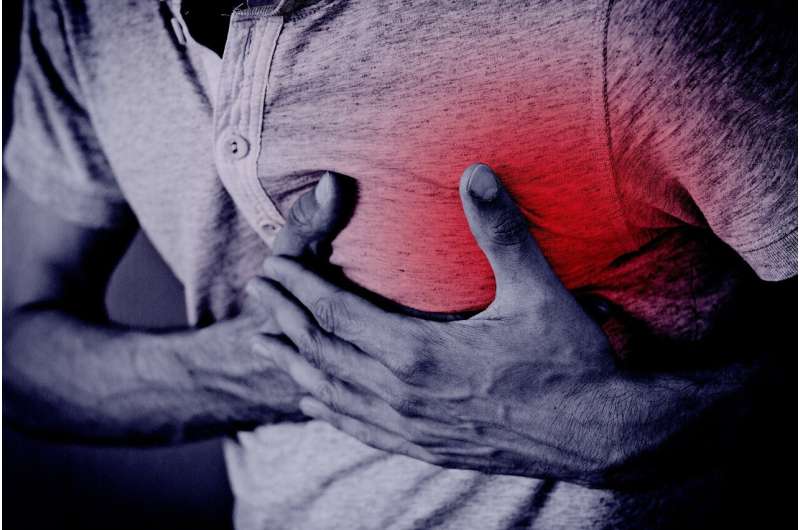This article has been reviewed according to Science X's editorial process and policies. Editors have highlighted the following attributes while ensuring the content's credibility:
fact-checked
trusted source
proofread
Recent recreational drug use triples risk of repeat serious cardiovascular event, research finds

New research presented at this year's ESC Congress 2024 in London, UK (30 Aug–2 Sept) shows that among patients admitted to the intensive cardiac care unit (ICCU), those with a recent history of recreational drug use are three times more likely than those with no history to experience a repeat serious cardiovascular event within one year.
"Among patients admitted to the intensive cardiac care unit (ICCU), systematic screening for recreational drugs evidenced a significant prevalence—11%—of recent use," said study author Dr. Raphael Mirailles, Hospital Lariboisiere, Paris, France. "Recreational drug use was associated with triple the risk of a repeat serious cardiovascular event within one year."
Previous work by the same group showed that this recent history of recreational drug use was associated with a higher rate of in-hospital outcomes. However, long-term cardiovascular consequences of recreational drug use remain uncertain.
In this study the authors aimed to evaluate the prognostic impact of recreational drug use at 1-year follow-up to predict serious cardiovascular events (including death) in consecutive patients admitted to ICCUs for acute cardiovascular events from the Addiction in Intensive Cardiac Care Units (ADDICT-ICCU) study.
All consecutive patients admitted to ICCUs over two weeks in April 2021 at 39 centers across France were included. Screening for recreational drug use was performed by systematic urinary testing. All patients provided written informed consent for participation and therefore approved urinary testing.
A one-year follow-up consisted of a clinical visit or direct contact with the patient and the referring cardiologist. The primary composite outcome was the occurrence of a serious cardiac event—cardiovascular death, non-fatal heart attack (MI) or stroke. Subgroup analysis was performed in patients hospitalized at baseline for acute coronary syndrome (non-fatal heart attack / angina lasting more than 20 minutes).
Of the 1,499 consecutive patients screened, 1,392 (93%) patients (mean age 63 years, 70% males) had a complete 1-year follow-up. Among them, 157 (11%) had an initial positive test for recreational drug use (cannabis, opioids, cocaine, amphetamines, 3,4-methylenedioxymethamphetamine [MDMA]). Among these positive results, the following drugs were found: cannabis: n=136, 9.8%; heroin and other opioids: n=32, 2.3%; cocaine: n=23, 1.7%; amphetamines: n=9, 0.6% MDMA (active ingredient of ecstasy: n=9, 0.6%). More than one-quarter of patients (n=45, 28.7%) tested positive for two or more of these drugs.
The test deployed for each drug simply provided a positive or negative result, but the amount required to give a positive test was substantial. The urine drug assay that was used continues to be positive 2 to 6 days after substance use. Therefore, it shows mainly recent exposure rather than regular use. On the other hand, an increase in major adverse events at one year might indicate chronic use.
After 1-year of follow-up, 94 (7%) patients experienced a serious cardiovascular event (including death). Patients with positive testing exhibited a higher rate of serious cardiovascular events than non-users (13% vs. 6%, respectively, a statistically significant finding).
The data was then adjusted for multiple factors—including age, sex, diabetes, current smoking status, history of cardiovascular disease before hospitalization, known chronic kidney disease, history of cancer, the main admission diagnosis, baseline systolic blood pressure, and baseline heart rate. Following this adjustment, recreational drug use was independently associated with a three times higher risk of serious cardiovascular events.
In the subgroup analysis of 713 patients hospitalized at baseline for acute coronary syndrome, 96 (14%) had a positive recreational drug test and 50 (7%) experienced serious cardiovascular events. Using computer modeling in this population, recreational drug use was still independently associated with a three times higher risk of serious cardiovascular events after adjustment for traditional prognosticators.
Among the 1,392 patients screened, there were 64 (4.6%) cardiovascular deaths, 55 (4.5%) among non-users and 9 (5.7%) among recreational drug users. Considering heart attack, there were 24 (1.7%) non-fatal heart attacks overall, 16 (1.3%) among non-users and 8 (5.1%) among drug users. Considering stroke, there were 10 (0.7%) strokes, and 7(0.6%) for non-users and 3 (1.9%) for drug users.
Among recreational drugs tested, MDMA (4.1 times increased risk), heroin and other opioids (3.6 times) and cannabis (1.8 times) were significantly associated with serious cardiovascular events. The other drug types did not have a statistically significant relationship with serious cardiovascular events.
Dr. Mirailles said, "In a large cohort of consecutive patients admitted to intensive care cardiac units for acute cardiovascular events, the prevalence of recreational drug use was 11%. Recreational drug use was associated with a tripling of the risk of a repeat serious cardiovascular event within one-year."
He added, "There is an increasing amount of data regarding the worst prognosis associated with recreational drug use, not only in cardiac intensive care units but also in conventional intensive care units. Despite a high rate of underreporting of recreational drug use, systematic screening is not recommended by the current guidelines. It might improve risk stratification of patients and personalized care to favor drug withdrawal. Therefore, systemic screening should be considered in intensive care."
More information: esc365.escardio.org/ESC-Congress/sessions/11476

















